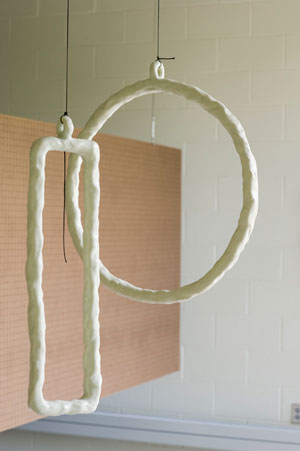
September 17, 2009
Ceramist explores "Almost Nothing"
By: Virginia Pelley
Special to The Examiner

Anders Ruhwald's pieces, by design, represent nothing in particular. (Courtesy photo)
Brightly colored, glazed earthenware curve and ooze in much of ceramist Anders Ruhwald�'s work.
Some pieces resemble rocks. A blazingly yellow, lumpy form fitted on one side with a bench made of slats of wood looks too weird to actually sit on. A rough-textured, white framelike circle hangs from a wire but contains nothing.
They are beautiful yet useless. That's the idea.
"I like the in-betweens of objects and things as they are lying around waiting for us to find uses for them," says Ruhwald, whose exhibition "Almost Nothing" is on view at the Gregory Lind Gallery in The City.
Ruhwald's conceptual craftwork invites viewers to examine how we process and relate to objects and how the things we surround ourselves with have a role in defining us. "Almost Nothing" involves the notion of an object being suggestive, rather than monolithic and defined.
One might expect Ruhwald's work to create distance between object and viewer. After all, what could be less inviting than a chair not fit for sitting on?
But Ruhwald's forms have an appealing dreaminess and evoke a familiar domesticity, even stripped of their usefulness.
The award-winning Danish artist - who currently divides his time between London and Detroit, where he is an artist-in-residence and instructor at the Cranbrook Academy of Art - draws viewers in with humor and literal reflections of themselves.
He has created many pieces that use mirrors; for an exhibition at Middlesbrough Institute of Modern Art in the U.K., Ruhwald lined the walls with reflective sheets of brass.
"It was important for me to underline visually that work is about perception, categorization and viewer engagement," he says. The viewer would constantly see her own distorted reflection while looking at the work.
Not long after he began working in ceramics at age 15, Ruhwald says he felt compelled to look beyond the object and examine fundamental relationships.
"It began to seem pressing to use my background as an object-maker and a form-giver to comment on the world of things, rather than just continue to produce for the endless slew of consumption," he says.
Ruhwald frequently speaks of change and encouraging dialogue when discussing his work.
"It is important that the role of things, design and combustion as it pertains to a system of endless growth is discussed, particularly in a place like America," he says -- especially today when some basic structures of society are up for discussion.